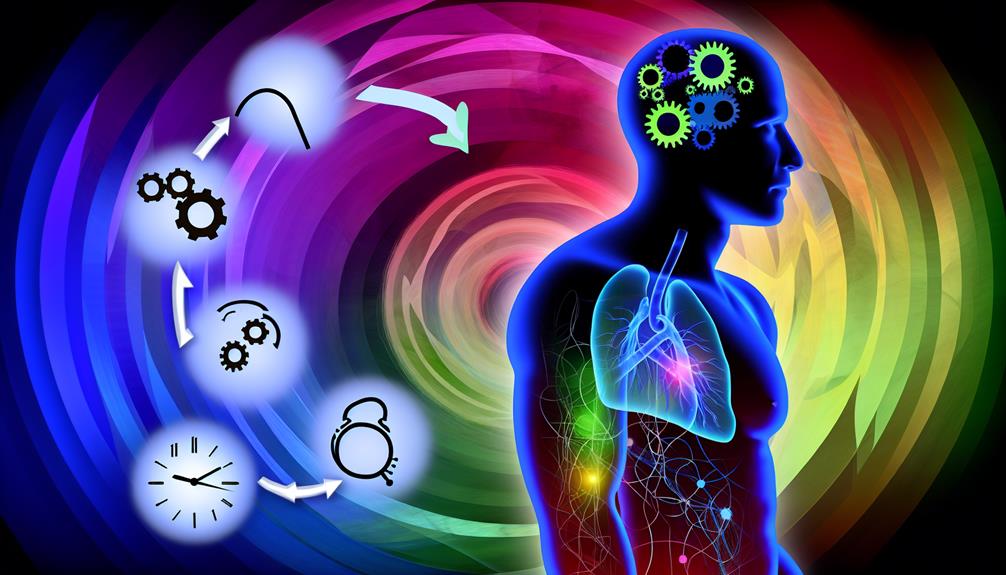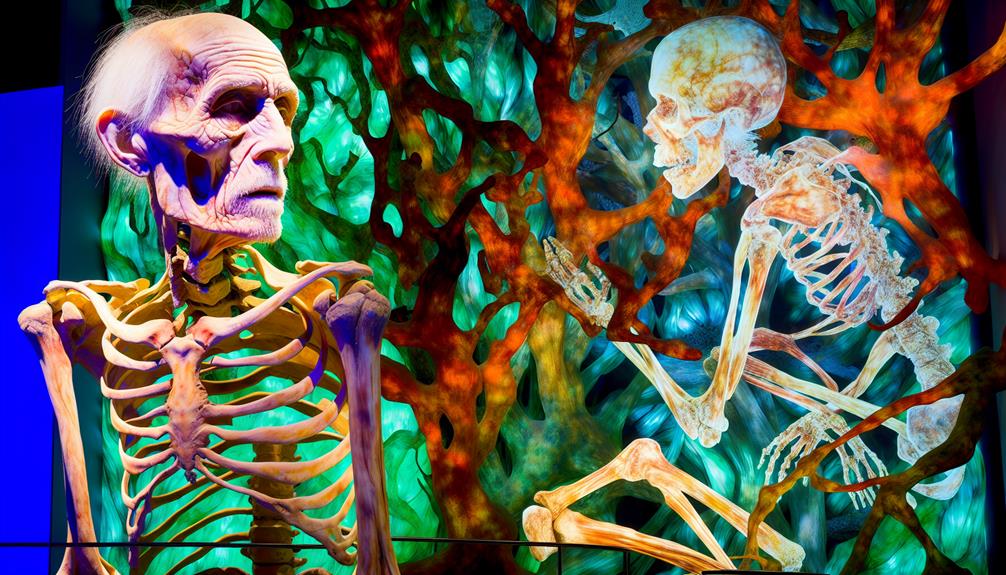As men age, I notice a progressive decline in testosterone levels, averaging about 1% annually after age 30. This reduction affects various aspects of health, including energy, mood, and muscle mass. Hormones like luteinizing hormone and DHEA also fluctuate, but their compensatory increase often falls short of maintaining adequate testosterone levels. Symptoms of low testosterone can include decreased libido, fatigue, and emotional instability, which complicate daily life. Understanding these hormonal changes is essential for optimizing health and mitigating aging effects. There's much more to reflect upon regarding effective strategies for managing these changes.
Understanding Male Hormones

When we explore understanding male hormones, it's essential to break down the various roles these hormones play in the male body. Male hormones, primarily produced by the testes and adrenal glands, include androgens, estrogens, and progestogens. Each of these hormones contributes to different physiological processes, from reproductive health to muscle mass regulation.
The endocrine system orchestrates these hormones' production and release, maintaining a delicate balance. Throughout a man's life, hormone fluctuations are normal and can notably impact mood, energy levels, and overall health. For example, testosterone levels peak during adolescence and early adulthood, gradually declining as men age. This decline can lead to symptoms like fatigue, decreased libido, and changes in muscle mass, which are often mistakenly attributed solely to aging.
Moreover, the interplay between hormones is essential. For instance, an imbalance in testosterone can lead to increased estrogen levels, which may further complicate health issues. Understanding these fluctuations is critical, as they can provide insight into broader health concerns, including cardiovascular health and metabolic syndrome.
In my observations, men often overlook the complexity of their hormonal health, focusing primarily on testosterone. However, appreciating the entire endocrine system's role not only enhances our understanding but also empowers us to address potential health risks more effectively. By recognizing the importance of maintaining hormonal balance, we can better navigate the challenges that come with aging.
The Role of Testosterone
Testosterone plays an essential role in various physiological functions within the male body, influencing everything from reproductive health to mental well-being. Understanding its production and interaction with hormonal receptors is vital for grasping its overall impact.
As I explore the specifics, it's evident that testosterone production occurs primarily in the testes, with a smaller contribution from the adrenal glands. This hormone binds to androgen receptors, which are found in various tissues, including muscle, bone, and brain. The interaction between testosterone and these receptors initiates a cascade of biological processes essential for male health.
To provide a clearer picture of testosterone's diverse roles, I've summarized its functions in the table below:
| Function | Description | Implications |
|---|---|---|
| Reproductive Health | Regulates sperm production and libido | Essential for fertility and sexual function |
| Muscle Mass | Promotes protein synthesis and muscle growth | Supports physical strength and metabolism |
| Bone Density | Influences bone remodeling and density | Aids in preventing osteoporosis |
| Mood Regulation | Affects mood and cognitive functions | Linked to depression and anxiety levels |
| Fat Distribution | Influences fat metabolism and distribution | Impacts overall body composition |
Age-Related Hormonal Changes

As men age, a noticeable decline in testosterone and other key hormones often takes place, impacting various aspects of health. This age-related decline is not merely a gradual drop in testosterone levels; rather, it involves complex hormonal fluctuations that can affect overall well-being. I've observed that testosterone levels typically peak in the late teens to early twenties, after which they begin a slow, progressive decline, averaging about 1% per year after the age of 30.
The interplay of hormones such as luteinizing hormone (LH) and follicle-stimulating hormone (FSH) also changes during this period. LH and FSH are essential for stimulating testosterone production in the testes. With age, the body may respond to lower testosterone levels by increasing the production of LH and FSH, yet this compensatory mechanism often proves insufficient in maintaining ideal testosterone levels.
Moreover, other hormones, such as dehydroepiandrosterone (DHEA) and insulin-like growth factor 1 (IGF-1), show similar patterns of decline. These hormonal fluctuations can lead to various health issues, including changes in body composition, mood disturbances, and metabolic alterations. Understanding these age-related hormonal changes is vital for identifying potential health risks and guiding appropriate interventions. It's essential to keep in mind that these fluctuations are individual; some men experience more pronounced declines than others, further complicating the landscape of aging and hormone health.
Symptoms of Low Testosterone
A decline in testosterone levels can lead to a range of symptoms that substantially impact a man's quality of life. As I've observed, testosterone deficiency often manifests through various physical and psychological changes, reflecting a hormonal imbalance that can arise with aging effects. These symptoms can considerably alter daily functioning and overall well-being.
Here are four key symptoms to bear in mind:
- Libido Decrease: Many men experience a noticeable drop in sexual desire, which can be distressing and contribute to relationship issues.
- Mood Changes: Fluctuations in mood, including increased irritability or feelings of sadness, are common and can have a profound psychological impact.
- Energy Fluctuations: Consistent fatigue or a lack of motivation can make even simple tasks feel overwhelming, complicating daily life.
- Muscle Loss: A decline in muscle mass and strength not only affects physical appearance but also poses risks to bone health and overall mobility.
Furthermore, nutritional deficiencies can exacerbate these symptoms, making it essential to address any underlying issues. The psychological impact of low testosterone is considerable, often leading to self-esteem issues and a sense of loss of vitality. Consequently, recognizing these symptoms is paramount for seeking appropriate interventions to restore balance and improve quality of life.
Impact on Energy Levels

As I observe the decline in male hormones with aging, I've noted a significant impact on energy levels that often correlates with decreased libido. This relationship suggests that hormonal changes might not only affect physical vigor but also overall motivation and drive. Consequently, understanding these dynamics is essential for identifying necessary lifestyle adjustments to mitigate these effects.
Hormonal Decline Effects
The decline in male hormones with age can greatly impact energy levels, leading to a noticeable decrease in vigor and endurance. As I've observed, this hormonal decline is tied closely to various aspects of life quality, making it important to understand its effects. Here's how hormonal fluctuations can manifest:
- Reduced Stamina: Simple activities can feel more exhausting, impacting daily life and personal goals.
- Decreased Motivation: A lack of energy can lead to diminished enthusiasm for exercise or hobbies, which affects overall health optimization.
- Increased Fatigue: I've noticed that even with adequate sleep, persistent tiredness can become a common issue.
- Emotional Variability: Lower testosterone levels can influence mood stability, complicating relationships and personal interactions.
Addressing these issues requires effective wellness strategies. Testosterone therapy may help restore hormonal balance, supporting endocrine health and enhancing male vitality. Understanding aging effects is significant for those of us aiming to age gracefully. By focusing on health optimization, we can mitigate the adverse impacts of hormonal decline and maintain a fulfilling life.
Energy and Libido Link
Hormonal decline not only affects energy levels but also plays a significant role in libido. As I've observed, testosterone levels naturally decrease with age, resulting in noticeable hormone fluctuations that can lead to a liveliness decline. This decline often manifests as reduced energy levels, impacting both physical and sexual health. The connection between energy and libido is profound; when I experience fatigue, my interest in sexual activities inevitably wanes.
To combat this, I've found that implementing effective wellness strategies can be important. Regular fitness routines not only help in managing energy levels but also enhance emotional wellbeing, which is essential for sustaining sexual desire. Exercise stimulates testosterone production and improves circulation, contributing to better sexual health.
Moreover, understanding that these changes are a natural part of aging gracefully allows me to approach them with a proactive mindset. By prioritizing my physical health and emotional wellbeing, I can mitigate some of the effects of hormonal decline. Ultimately, recognizing the interplay between energy levels and libido has been significant in steering through this aspect of aging, ensuring that I maintain both liveliness and a fulfilling sexual life.
Lifestyle Adjustments Needed
Three key lifestyle adjustments can greatly impact energy levels as we age. I've found that focusing on these areas not only enhances my overall well-being but also helps manage the hormonal changes we experience. Here's what I consider fundamental:
- Dietary Changes: Emphasizing whole foods rich in nutrients can improve energy levels. Incorporating adequate hydration levels is essential, as dehydration can lead to fatigue.
- Physical Activity: Regular exercise is critical. It boosts energy and aids in maintaining a healthy weight, improving relationship dynamics as an added benefit.
- Sleep Hygiene: Prioritizing quality sleep is non-negotiable. Establishing a consistent sleep routine has positively affected my energy and cognitive function.
- Stress Management and Mindfulness Practices: Engaging in mindfulness practices, such as meditation or yoga, helps mitigate stress. This, alongside fostering social connections, can enhance emotional resilience.
These adjustments, along with routine check-ups and health screenings, empower us to combat the effects of aging. By focusing on these areas, I've noticed a significant improvement in my energy levels, making daily tasks more manageable and enjoyable.
Effects on Libido
As I examine the effects of aging on male hormones, it's clear that a decline in testosterone markedly influences libido. Psychological factors, such as stress and self-esteem, also play a critical role in shaping sexual desire. Additionally, lifestyle choices can either exacerbate or mitigate these hormonal changes, highlighting the complex interplay between biology and behavior.
Testosterone Decline Impact
The decline in testosterone levels with aging can lead to significant changes in libido, a complex interplay of biological and psychological factors. As I observe this phenomenon, it's evident that the age-related decline in testosterone affects not only male energy but also several other aspects of life. Here's how this decline impacts libido:
- Hormonal Supplementation: Lower testosterone can reduce sexual desire, prompting many to contemplate testosterone therapy or hormone replacement to restore hormonal balance.
- Endocrine Function: The decreased testosterone levels interfere with endocrine function, further complicating sexual health.
- Physical Performance: Aging men often experience diminished physical performance, which can negatively influence confidence and libido.
- Emotional Well-being: The metabolic changes associated with low testosterone can lead to mood swings, anxiety, and depression, all of which can contribute to decreased sexual interest.
Psychological Factors Involved
Psychological factors play an essential role in shaping libido, especially as testosterone levels decline with age. The interplay between emotional well-being and hormonal changes can greatly affect sexual desire. As men age, the psychological impact of life events—such as career shifts, retirement, or relationship changes—can lead to decreased libido.
Here's a table that outlines some common psychological factors and their effects on libido:
| Psychological Factor | Effect on Libido |
|---|---|
| Stress and Anxiety | Decreased sexual desire |
| Depression | Lowered libido |
| Relationship Issues | Can lead to fluctuations in desire |
Understanding these factors is vital. Stress and anxiety can hinder sexual interest, creating a cycle where decreased libido further exacerbates emotional distress. Conversely, positive emotional well-being often correlates with an increased sexual drive.
As testosterone diminishes, it's not just the hormonal changes we should consider, but the psychological landscape that shapes our sexual health. Recognizing and addressing these psychological factors can help in maintaining a healthy libido, emphasizing the importance of emotional well-being in the aging process.
Lifestyle Influence on Libido
While psychological factors considerably influence libido, lifestyle choices also play an essential role in shaping sexual health. I've noticed that various aspects of my daily life greatly impact my sexual drive and overall well-being. Here are four key lifestyle factors that I've found important:
- Sleep Quality: Adequate rest is essential for emotional wellness and hormonal balance. Poor sleep can lead to increased stress and reduced libido.
- Stress Management: Chronic stress affects relationship dynamics and can diminish physical attraction. Engaging in relaxation techniques is crucial for maintaining sexual health.
- Social Connections: Strong social ties foster intimacy communication and partner support, enhancing emotional and sexual connection.
- Mental Stimulation: Engaging in intellectually stimulating activities not only invigorates the mind but also contributes to heightened libido through increased emotional wellness.
Mood Fluctuations and Mental Health

As men age, fluctuations in hormone levels, particularly testosterone, can greatly impact mood and mental health. I've observed that these hormonal changes often lead to increased mood swings, which can disrupt emotional well-being. This instability may arise from a diminished ability to regulate emotions, potentially leading to heightened anxiety and a greater depression risk.
The stress response is another important factor influenced by hormonal balance. As testosterone levels decline, men might experience a less effective stress response, making it harder to cope with daily challenges. This decline can hinder cognitive function, impairing decision-making and problem-solving abilities, which are essential for maintaining mental resilience.
Moreover, social interactions can suffer as mood fluctuations make it difficult to engage with others consistently. This isolation can exacerbate feelings of loneliness and further increase the risk of depression. In my experience, effective anxiety management becomes vital during this period. Strategies such as mindfulness, physical activity, and social support can greatly enhance emotional regulation and bolster overall mental health.
Recognizing these patterns can empower men to take proactive steps toward maintaining a healthier emotional state. By prioritizing hormonal balance through lifestyle adjustments, I believe individuals can mitigate the adverse effects of aging on mood and mental health. Understanding the interplay between hormone levels and emotional well-being is essential for fostering a sense of stability and resilience in the face of life's inevitable challenges.
Changes in Muscle Mass
The decline in testosterone levels with age greatly contributes to changes in muscle mass, a phenomenon I've observed in many men. As testosterone plays a vital role in muscle preservation, its decrease can lead to significant alterations in body composition. I've noted four key changes that often occur:
- Reduced Muscle Mass: Men typically experience a decrease in lean muscle mass, which can start as early as their 30s. This loss becomes more pronounced with advancing age.
- Decreased Strength: With the reduction in muscle mass, there's a corresponding decline in overall strength, making everyday tasks more challenging.
- Increased Fat Mass: As muscle mass decreases, body fat often increases, leading to changes in physique and potential metabolic issues.
- Slower Recovery: The aging process can also slow recovery times after physical exertion, further complicating muscle maintenance and performance.
To counteract these changes, strength training becomes essential. Engaging in regular resistance exercises can stimulate muscle growth, mitigate the effects of testosterone decline, and enhance functional capacity. It's important to adopt a structured strength training regimen tailored to individual needs. This approach not only aids in muscle preservation but also supports overall health.
Bone Density and Aging

Bone density is a significant aspect of skeletal health that often declines with age, particularly in men experiencing hormonal changes. As testosterone levels decrease, I've noticed a direct impact on bone health, making the aging skeleton more susceptible to osteoporosis risk. This decline in bone density can lead to fractures, mobility issues, and a reduced quality of life.
Maintaining hormonal balance is important in combating these changes. Engaging in regular weight-bearing exercise has shown significant benefits for bone density. It promotes the formation of new bone tissue and increases overall strength, helping to mitigate the adverse effects of aging. I've found that incorporating resistance training into my routine not only supports bone health but also enhances muscle mass, which is equally essential as I age.
In addition to exercise, I've learned that lifestyle choices play a significant role in bone density. Smoking cessation and limiting alcohol intake are preventive measures I prioritize. These choices directly affect nutrient absorption, particularly calcium and vitamin D, both of which are critical for maintaining bone density.
While aging is inevitable, I believe we can take proactive steps to support our bone health. By focusing on exercise, diet, and overall lifestyle, I can help reduce the risk of osteoporosis and guarantee a healthier, more active life as I grow older. It's about making informed decisions now to secure my skeletal health for the future.
Nutritional Factors in Hormone Health
In examining hormonal health, I find that essential nutrients play a vital role in maintaining ideal hormone levels. The types of dietary fats consumed greatly influence hormonal balance, while specific micronutrients can either support or hinder hormone production. Understanding these nutritional factors is fundamental for anyone looking to manage their hormone health effectively.
Essential Nutrients for Hormones
Several key nutrients play an important role in maintaining hormonal balance as we age. Understanding these nutrients can help us implement effective dietary strategies to support hormone health. Here are four essential nutrients I consider fundamental:
- Zinc: Found in nutrient sources like oysters, red meat, and legumes, zinc is essential for testosterone production.
- Vitamin D: This vitamin, primarily obtained through sunlight exposure and fortified foods, influences testosterone levels and overall hormonal function.
- Omega-3 Fatty Acids: Present in fatty fish, flaxseeds, and walnuts, omega-3s support hormonal balance by reducing inflammation and enhancing insulin sensitivity.
- Magnesium: Available in leafy greens, nuts, and whole grains, magnesium is necessary for ideal testosterone synthesis and plays a role in various biochemical reactions.
Incorporating these nutrients into my diet not only helps regulate hormonal levels but also contributes to overall well-being. By focusing on diverse nutrient sources and crafting thoughtful dietary strategies, I can better support my hormonal health as I age. Understanding the relationship between these essential nutrients and hormone balance is a proactive step towards maintaining energy throughout life.
Impact of Dietary Fats
Dietary fats play an essential role in hormone health, influencing everything from testosterone production to overall hormonal balance. Understanding the types of fats we consume is important; saturated fats can negatively impact hormone levels if consumed excessively, while unsaturated fats, particularly omega-3 and omega-6 fatty acids, offer significant omega benefits that support hormone synthesis.
When considering our dietary sources of fats, it's imperative to focus on nutrient balance and meal timing to optimize fat absorption. A well-structured diet pattern that emphasizes healthy fat intake can mitigate health implications associated with aging.
Here's a table to illustrate the impact of different fat types on hormone health:
| Fat Type | Dietary Sources | Health Implications |
|---|---|---|
| Saturated Fats | Red meat, butter | Potentially lowers testosterone |
| Unsaturated Fats | Olive oil, avocados | Supports hormonal balance |
| Omega-3 Fats | Fatty fish, flaxseeds | Enhances testosterone levels |
| Omega-6 Fats | Nuts, seeds | Can influence inflammation |
| Trans Fats | Processed foods | Disrupts hormone function |
Role of Micronutrients
Micronutrients play an essential role in maintaining hormonal health, especially as we age. A micronutrient deficiency can disrupt hormonal balance, leading to a range of health issues. As I've explored this topic, I've identified four key micronutrients important for supporting male hormonal health:
- Zinc: Critical for testosterone production, zinc deficiency can lead to decreased levels of this hormone, affecting libido and muscle mass.
- Vitamin D: This vitamin is linked to testosterone levels; insufficient vitamin D can impair its synthesis, contributing to hormonal imbalance.
- Magnesium: Significant for numerous biochemical reactions, magnesium supports testosterone production and helps mitigate stress, which can further stabilize hormonal levels.
- B Vitamins: These vitamins aid in energy metabolism and play a role in regulating mood and stress, both of which are essential for maintaining hormonal equilibrium.
Incorporating these micronutrients into my diet, through foods like nuts, leafy greens, and fish, has proven beneficial. I've noticed that addressing micronutrient deficiencies can greatly impact overall hormonal health, making it essential to monitor and adjust my nutritional intake as I age.
Exercise and Its Benefits

As we age, incorporating regular exercise becomes essential for maintaining ideal hormone levels and overall health. I've found that a balanced routine featuring strength training, aerobic exercise, and flexibility routines is important. This combination not only supports testosterone levels but also enhances overall physical activity and well-being.
To provide a clearer understanding, I've organized the benefits of different exercise types in the table below:
| Exercise Type | Benefits |
|---|---|
| Strength Training | Increases muscle mass, boosts testosterone levels, and improves metabolism. |
| Aerobic Exercise | Enhances cardiovascular health, promotes fat loss, and aids in stress reduction. |
| Flexibility Routines | Improves range of motion, reduces injury risk, and enhances recovery periods. |
| Sports Participation | Encourages social interaction, maintains workout motivation, and supports exercise frequency. |
Engaging in regular physical activity is essential for achieving fitness goals, and I've noticed that setting specific targets keeps me motivated. It's important to allow adequate recovery periods between workouts to prevent injury and promote muscle repair.
Furthermore, I've found that participating in sports offers a dual benefit: it provides a structured workout and fosters social connections, which can also enhance workout motivation. By prioritizing exercise frequency and varying activities, I can effectively manage stress and maintain hormonal balance as I age. Remember, the key is consistency; finding a routine that fits your lifestyle will lead to long-term health benefits.
Hormone Replacement Therapy Options
When considering ways to address declining hormone levels, hormone replacement therapy (HRT) presents several options that can be tailored to individual needs. It's essential to approach this topic with a thorough understanding of the various treatment options available, weighing both benefits and health risks. Here's a breakdown of the primary categories of HRT:
- Synthetic Hormones: These are lab-created hormones that can effectively increase testosterone levels. However, they may carry health risks, including cardiovascular issues.
- Natural Supplements: Many individuals opt for natural testosterone boosters derived from plant-based sources. While they might have fewer side effects, their efficacy can vary considerably.
- Hormone Therapies: This broader category includes a range of methods, such as injections, transdermal patches, and pellets, allowing for versatile administration of hormones.
- Patient Education and Doctor Consultations: Engaging in open discussions with healthcare professionals is essential. They can provide insights into potential health risks and guide you through the appropriate treatment options.
As I consider these alternatives, I realize the importance of informed decision-making. Each treatment option comes with its own set of implications, and understanding them involves thorough patient education. Ultimately, the right choice depends on individual health circumstances, preferences, and the guidance of qualified healthcare providers. It's important to balance the potential benefits against the associated risks, ensuring a safe and effective approach to managing hormone levels.
Lifestyle Modifications for Balance

Achieving hormonal balance is often a multifaceted journey that extends beyond medical interventions. In my experience, integrating specific lifestyle modifications can meaningfully influence hormonal equilibrium. First, I've found that incorporating stress management techniques, such as deep breathing exercises and yoga, plays an essential role in reducing cortisol levels, which can otherwise disrupt hormonal balance.
Improving sleep quality is another important factor. I prioritize a consistent sleep schedule and utilize mindfulness practices to enhance my nightly rest. This not only rejuvenates my body but also supports testosterone production. Moreover, I've adopted hydration strategies to maintain peak bodily functions, recognizing that even mild dehydration can impact hormone levels.
Balanced meal planning is critical as well. I focus on including healthy fats, lean proteins, and whole grains in my diet, which provides the necessary nutrients for hormone synthesis. Regular health checkups help me monitor my progress and make necessary adjustments. Additionally, I explore various physical activity types—strength training, cardio, and flexibility exercises—to promote overall health and hormonal balance.
I've also discovered that spending time outdoors offers numerous benefits, including improved mood and increased vitamin D levels, which are essential for hormone regulation. Finally, while I consider supplements, I approach them with caution, ensuring they're based on my individual needs and under professional guidance. By integrating these lifestyle modifications, I've fostered a more balanced hormonal profile, enhancing my overall wellbeing and vitality.
Frequently Asked Questions
How Can Stress Affect Male Hormone Levels as Men Age?
I've found that stress can greatly impact hormone levels in men, particularly as they age. When I'm under stress, my body produces cortisol, a hormone that, when elevated, can disrupt the balance of testosterone and other hormones. Effective stress management techniques, like mindfulness and exercise, can help mitigate these effects. By keeping cortisol levels in check, I can support my overall hormonal health and maintain better well-being throughout the aging process.
Are There Genetic Factors Influencing Male Hormone Changes With Age?
I've often wondered about genetic factors influencing male hormone changes. Genetic predisposition plays a significant role in how our bodies respond to hormonal fluctuations over time. Studies suggest that certain genes can affect hormone production and regulation, leading to variations in testosterone levels among men. This means that some individuals may experience more pronounced changes as they age, while others might maintain more stable hormone levels, highlighting the importance of genetics in this complex process.
Can Environmental Toxins Impact Male Hormone Levels in Aging Men?
I've found that environmental pollutants can markedly impact male hormone levels. Chemical exposure from everyday products can lead to hormone disruption, affecting the endocrine system. These disruptions can stem from various lifestyle choices, such as diet and occupational hazards. The health implications are concerning, as altered hormone levels can contribute to numerous issues, including reproductive health problems and metabolic disorders. It's essential to be aware of these factors in maintaining overall well-being.
What Are the Long-Term Effects of Low Testosterone on Overall Health?
When I consider the long-term effects of low testosterone on overall health, I note that it can lead to various issues like reduced muscle mass, increased body fat, and decreased bone density. These aging effects can also impact mood and cognitive function. Testosterone replacement therapy may mitigate some of these concerns, but it's essential to assess risks and benefits carefully. Understanding these dynamics helps me make informed decisions about my health as I age.
How Do Sleep Patterns Influence Hormone Levels in Aging Men?
I've found that sleep patterns greatly influence hormone levels, especially in aging men. Sleep deprivation disrupts circadian rhythms, which can lead to decreased testosterone production. When I don't get enough quality sleep, I notice not just fatigue but also changes in my mood and energy levels. This cycle can worsen over time, leading to further hormonal imbalances. Prioritizing good sleep hygiene is essential for maintaining ideal hormonal health as we age.
